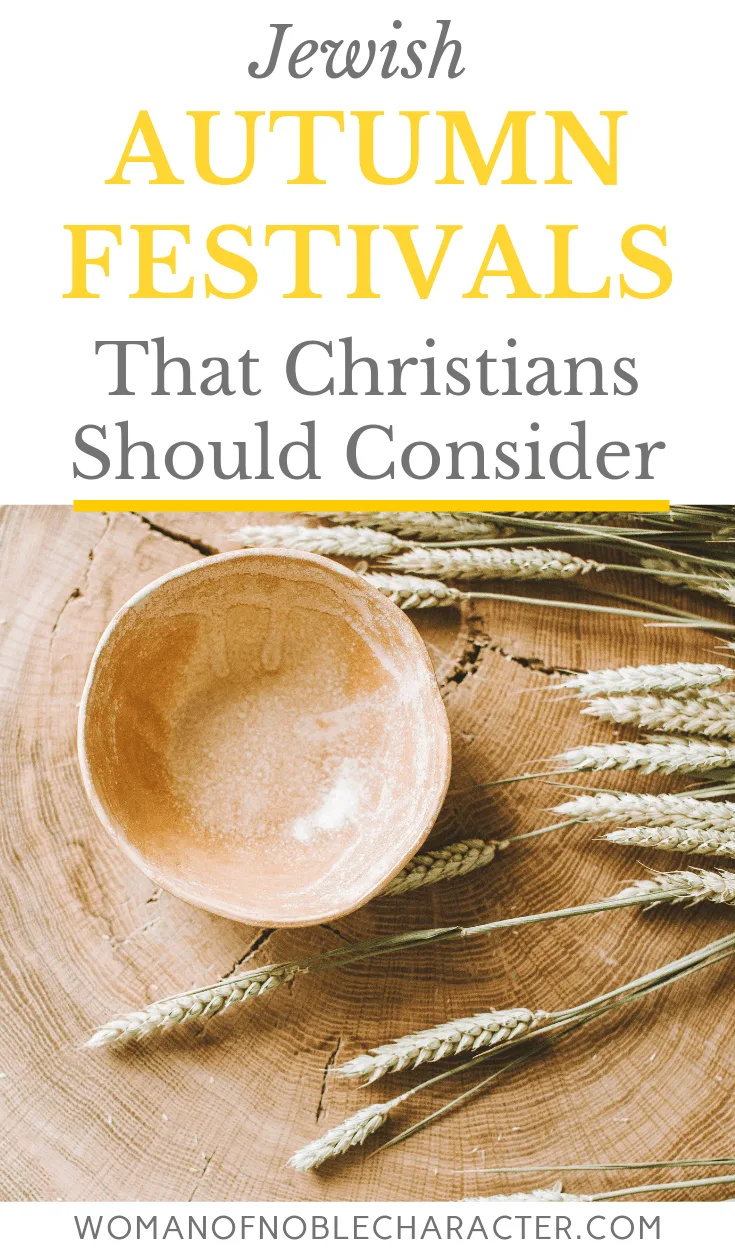This page/post may contain affiliate links. As an Amazon Associate, as well as an affiliate of other programs, this means if you purchase something using these links, I will receive a commission on qualifying purchases at no cost to you! For more detailed information, please visit our Affiliate Disclaimer page
Why Christians should celebrate Jewish festivals. Should they or shouldn’t they?
Autumn is approaching quickly and, with them, the fall festivals. These are sometimes looked at as “Jewish holidays” and while they are, that does not mean Christians cannot celebrate. They are Biblical feasts, festivals of the Lord, and hold meaning for the Christian as well.
Galatians 3:28 says:
“There is neither Jew nor Gentile, neither slave nor free, nor is there male and female, for you are all one in Christ Jesus.” NIV
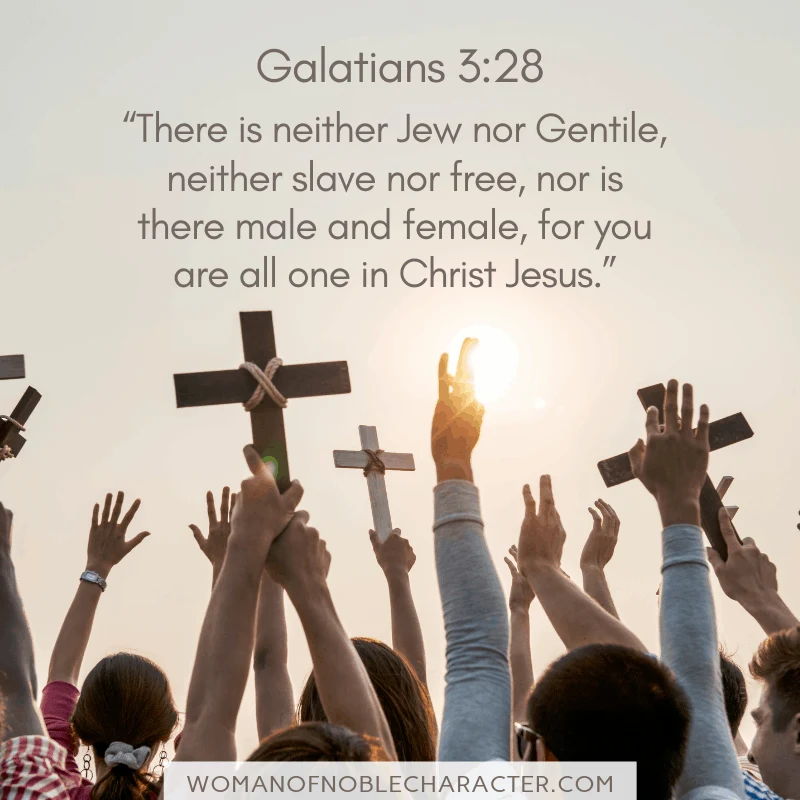
We are Jew and Gentile, one in Yeshua HaMashiach. As such, the Jewish festivals are also for all believers and those who want to celebrate them to honor the God of Israel.
There are significant reasons why Christians and Messianic Jews (Jews who believe in Yeshua [Jesus] as the Messiah) should celebrate the Jewish festivals. While under no obligation to keep them, there are benefits that should not be overlooked.
There are two festivals in particular that hold significant meaning for both Jew and Gentile believers, which I will go into. But first let’s discuss the benefits.
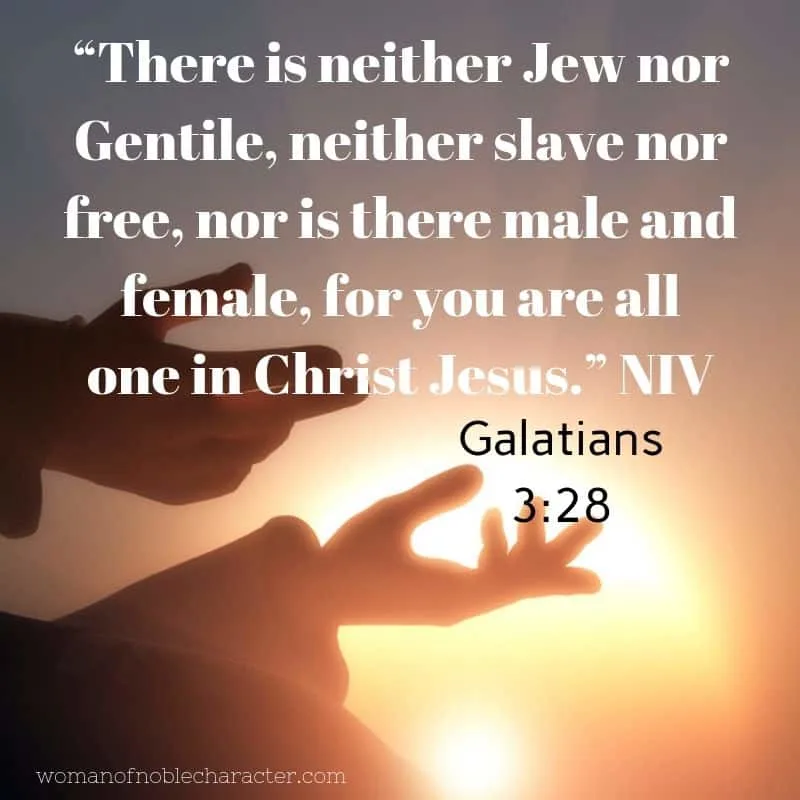
Benefits of Keeping the Jewish Festivals
- They show us how God is working in our lives right now! The Jewish festivals point the way to Jesus and in celebrating we can see God’s saving grace, His goodness in how He cares about every part of our lives, and the sacrifice Jesus made for our sins has now given us a life we can live out of bondage.
- They help us recall the past. Each festival God tells the people to keep as a remembrance. If we never look back to see where we came from, we miss seeing the goodness of God in all He has done. When we do not look back to the first Passover (not a fall festival but just to illustrate the point) we don’t see how Jesus became our Passover Lamb and lose the meaning of Revelation 13:8 when it says “the Lamb who was slain from the creation of the world”.
- They point to future events. These festivals have had prophetic significance, not only in the way Jesus has fulfilled them but in the way there are some yet to be fulfilled. And we will look at that future promise in the fall Jewish festival of Rosh Hashanah or the Feast of Trumpets
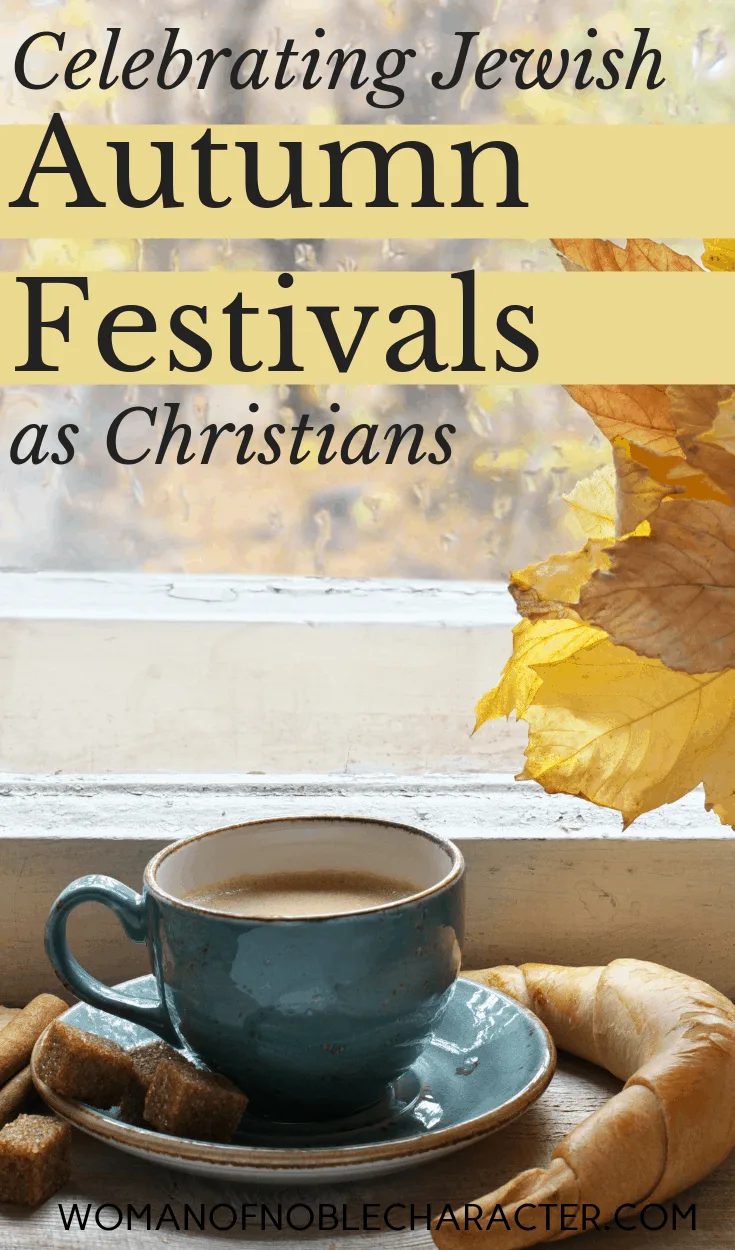
Rosh Hashanah – The Feast of Trumpets
Yom Teruah is the Feast of Trumpets and Rosh Hashanah means the Head of the Year or the New Year.
They are the same festival but the Biblical name for it is Yom Teruah.
Trumpets here are not the brass instrument we might think of today, but the shofar or ram’s horn.
Although it is known as the New Year, technically it is A new year, not THE new year.
In Israel there are actually multiple new years, much like we have multiple new years here in the United States such as tax years, fiscal years and so on.
It is also known as the anniversary of creation. For that reason it is the New Year of years, meaning it is the day the calendar advances.
It is also associated with the Akedah or the Binding of Isaac. It is when Abraham took his son Isaac up to the mountain to sacrifice him per the Lord’s command. When the Lord stopped Abraham, he found a ram in the thicket and sacrificed it to the Lord and the ram’s horn is said to be a reminder of Abraham’s obedience. This story is read in synagogues throughout the world on Rosh Hashanah.
But most importantly is its prophetic significance.
Rosh Hashanah is associated with the rapture of the church. The Bible tells us we don’t know the day or hour but it says we can know the season.
The trump is sounded on Rosh Hashanah as a command to hear the shofar blown, and it is sounded according to a pattern. It is not just blown once but it is blown 100 times in various patterns, some fast and some slow. And the Bible references the LAST trump.
1 Corinthians 15:52 says:
“in a flash, in the twinkling of an eye, at the LAST TRUMPET. For the trumpet will sound, the dead will be raised imperishable, and we will be changed.” NIV (emphasis mine)
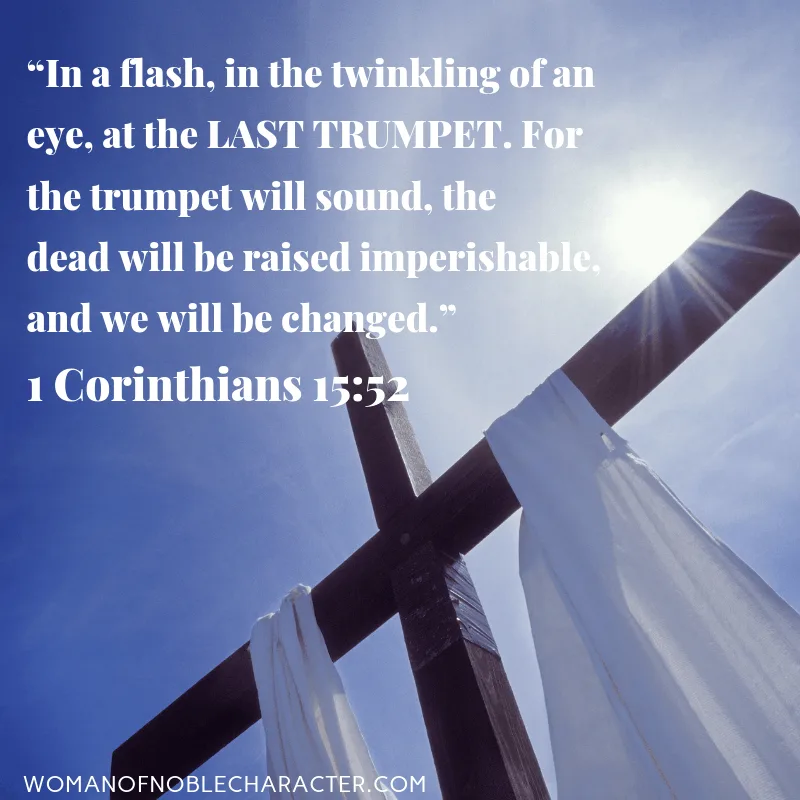
God has used the Jewish festivals as patterns for us to follow. And Rosh Hashanah may hold a place in the return of Jesus for His church. Again, it does not mean we know the day or hour…it could be this year it could be 10 years from now. But He tells us to watch and KNOW THE SEASON.
Rosh Hashanah Traditions
Rosh Hashanah is one of the Jewish festivals that comes with such lovely traditions that make it one of my favorite holidays.
First, there is the tradition of Taschlich. Imani Ackerman wrote a wonderful post about this tradition that you can read more about. It deserves far more elaboration than I can give it here. But it is the tradition of going to a river or a body of water on Rosh Hashanah and taking a stone, reflecting on your sins and God’s redemption, and casting that stone into the water. I highly recommend reading that post and you can find it here.
It is closely knit to the scripture in Psalm 55:22
“Cast your cares on the Lord and he will sustain you; he will never let the righteous be shaken.” NIV
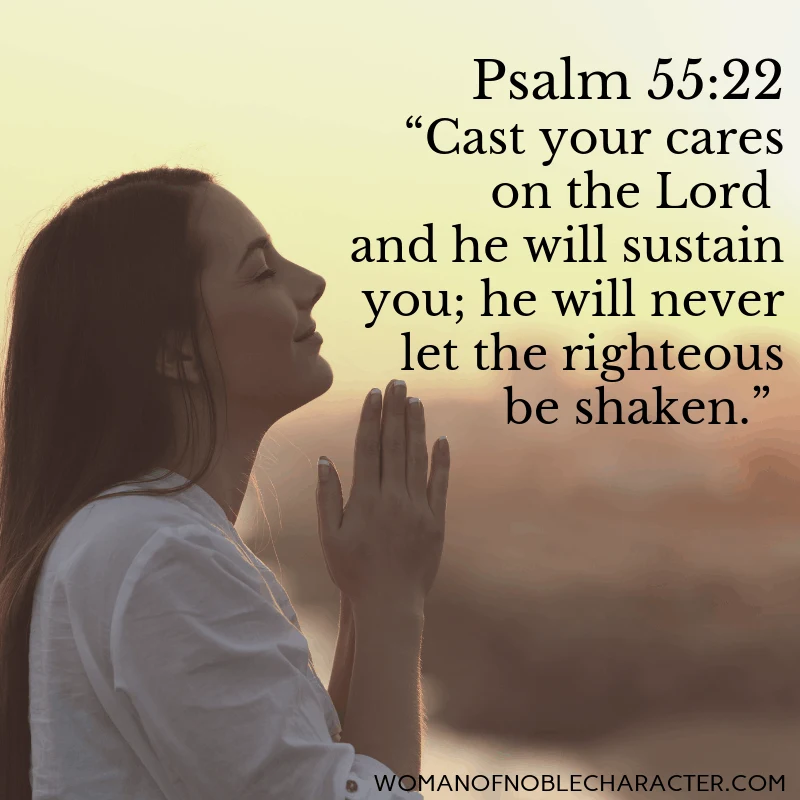
And also Micah 7:19
“You will again have compassion on us; you will tread our sins underfoot and hurl all our iniquities into the depths of the sea.” NIV
There is the tradition of baking a round Challah. Challah is a special braided bread that is a staple in Jewish homes, often made on Shabbat. But on Rosh Hashanah it is braided and then made into a circle instead of a loaf to represent the full circle of the year. There is a lot of tradition around the Challah (and it makes fabulous French toast!) so I recommend reading more about it.
Honey is another staple of Rosh Hashanah. It is to express excitement for a sweet new year ahead!
There is so much about Rosh Hashanah to love and celebrate! You can check out my audio teaching on it for much more information here.
Yom Kippur – The Day of Atonement
Rosh Hashanah and Yom Kippur make up what is known as the 10 Days of Awe or Yamim Noraim.
These are the days of atonement and reconciliation.
Yom Kippur in Judaism is the day to afflict the soul and atone for sins. It is also a time to make amends with anyone you may have sinned against or offended.
It is believed that God inscribes the fate of a person in the “Book of Life” on Rosh Hashanah and the He waits until Yom Kippur to seal that book, sealing their fate for the next year.
So a person would have from Rosh Hashanah to Yom Kippur to perform “teshuvah,” or repentance.
One of the most well-known traditions of Yom Kippur is the 25 hour fast (Christians usually observe 24 hours) and no work is to be done.
The Scapegoat – A Picture of Jesus
Entering the Holy of Holies was the privilege and duty of one man; the High Priest! Yom Kippur was the only day of the year the he could enter.
He was to bathe, likely in a mikvah, and put on special robes. A bull was then sacrificed for a sin offering for himself and his family. The blood of the bull was then sprinkled on the Mercy Seat which sat upon the Ark of the Covenant.
Two goats were to be brought in; one to be sacrificed for the sins of Israel. He would sprinkle its blood on the Mercy Seat. Which one would be sacrificed would be left up to God and that would be done by casting lots.
The second goat was the Azazel or the scapegoat.
The high priest placed his hands on the goat’s head, he would state out loud the sins of the people and atone for their rebellious nature, and this would transfer their sins from them onto the scapegoat.
A man was specially selected to take the goat far into wilderness so that there was no risk of it returning to camp looking for food.
The goat would be released out into the wilderness, where he carried away the sins of Israel for the year. This would be done year after year. This account can be found in Leviticus chapter 16.
Jesus took our sins on Himself once and for all and became the Azazel, the scapegoat, for us. He bore our sins and carried them outside the city onto a hill where He would bring them to a wooden cross once and for all.
Never again do we have to worry about our names being in the Book of Life. We never have to worry each year if we have atoned enough. Jesus became our High Priest and the veil of the temple was rent in two giving us, His people, access to God and we can sit before the Mercy Seat and speak with Him.
Isaiah 53:6
“All we like sheep have gone astray;
we have turned—every one—to his own way;
and the Lord has laid on him
the iniquity of us all.” ESV
The beauty of the Jewish festivals is wrapped up in its past, present and OUR future. Jesus is returning for His church, at the last trumpet. We will go in and sit before His throne!
So why should Day of Atonement matter for Christians? It can be a beautiful time for us to fast, rest, and focus on Jesus and the sacrifice He made for our sins so that we CAN be written in the Book of Life for eternity. It is a time we can make amends with others and forgive those who have offended us, even if they have not asked for it.
Jewish festivals are rich in tradition and remembrance. Christians should celebrate Jewish holidays and festivals as part of their own traditions of faith because of the prophetic significance of them.
Scripture quotations are from The ESV® Bible (The Holy Bible, English Standard Version®), copyright © 2001 by Crossway, a publishing ministry of Good News Publishers. Used by permission. All rights reserved.
Scriptures taken from the Holy Bible, New International Version®, NIV®. Copyright © 1973, 1978, 1984, 2011 by Biblica, Inc.™ Used by permission of Zondervan. All rights reserved worldwide. www.zondervan.com The “NIV” and “New International Version” are trademarks registered in the United States Patent and Trademark Office by Biblica, Inc.™

Diane is a wife and mom, a Messianic Jewish believer in Yeshua (Jesus) and blogger/owner of Worth Beyond Rubies. She lives in BEAUTIFUL Northwestern Connecticut and when she is not blogging you will find her spending time with her husband and kiddos, working out on their mini farm! She is also an avid amateur genealogist and loves researching her rich family history!
You can find Diane and more teachings on the Jewish festivals on the web at:
Facebook – https://www.facebook.com/worthbeyond
Twitter – https://www.twitter.com/worthbeyondruby
Pinterest – https://www.pinterest.com/worthbeyondrubies
Instagram – https://www.instagram.com/worthbeyondrubies
Why writing scripture helps build your faith.
